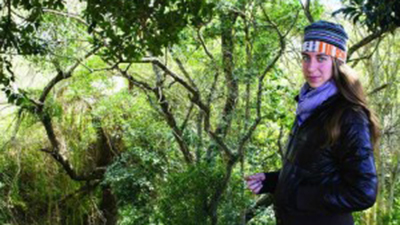“Hi Donna, this is Emmaly. I met you this morning as part of your performance art piece. I’m calling because I thought we were supposed to meet at 5pm to place your blood in a ravine.” This was by far the oddest introduction I had ever made of myself. Yesterday morning at 10am I headed to The 1820 Settlers’ Monument to try to find Donna Kukama’s The Museum of Non-Performance. As she is the winner of the 2014 Standard Bank Young Artist for Performance Art, I was naturally curious to see Kukama’s work. This was complicated by the fact that the main programme did not include listings to see it. After asking three people at the Box Office, someone was finally able to direct me to Kukama’s exhibit on the second floor. I had heard that she only saw one person at a time and devoted half an hour to each person. Thus, I was both relieved and worried when I saw two women already waiting. I sat and chatted with them, learning that they had been there for almost 45 minutes. Luckily, they gave up, leaving me first in the queue. In time, I was invited in to a little hut. It was completely dark. A wall with a glass window divided the space in half. I was instructed to sit in front of the glass. Kukama sat on the other side. She began by asking me some questions: “Have you ever experienced discrimination? What is your earliest memory? What is the earliest smell you can remember?” I told her about the smell of my grandmother’s perfume. “What was the most notable feature about your grandmother?” I responded that it was her hair. Then Kukama asked me the big question: “Would you be willing to contribute something from your body to The Museum of Non-Permanence?” Kukama suggested my hair, as it related to my memory of my grandmother. “Sure,” I said. Through a small hole in the floor, Kukama passed me a small plastic bag, in which I placed a few hairs I pulled from my head. I signed and dated a certificate documenting my contribution. Then Kukama asked me if I wanted to host a monument. When she told me it entailed taking something from her body and putting it in a place of significance somewhere in Grahamstown, I thought, “Why not?” Kukama decided she would contribute her blood, which she drew with a syringe into a capsule. My place of significance was a pretty little ravine I pass daily near where I’m staying. We agreed to meet there at 5pm. This is where my phone call came in. When Kukama arrived it was growing dark. We walked to the ravine, a woodsy area overgrown with trees, brush and a little brook. She wrapped her capsule of blood in dried flowers and cloth and burned the flowers to perfume the air. And then I threw it into the ravine. Kukama told me she had collected monuments from 20 people, and all of them had additionally agreed to host a monument. So hidden all over Grahamstown are little monuments, little pieces of people and memory. It might sound odd, this exchange of body parts, but there was actually something quite special about it. I will be crossing that ravine every day for the remainder of the Festival until I leave Grahamstown, and now it has taken on special significance. It is my monument from Kukama, who in return will keep my hairs. Neither will be permanent, but they will be memorable.
– By Emmaly Wiederholt


